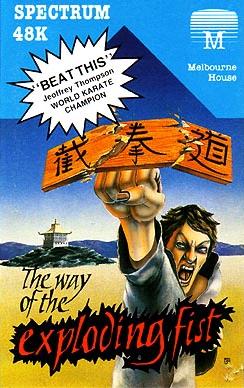
The Way of the Exploding Fist is a 1985 fighting game based on Japanese martial arts developed by Beam Software, by a team consisting of Gregg Barnett, Bruce Bayley, Neil Brennan and David Johnston. Originally developed on the Commodore 64 and published in May 1985 by Melbourne House, ports were made for Amstrad CPC, ZX Spectrum, BBC Micro, Acorn Electron and Commodore 16.

The Quill is a program to write home computer adventure games. Written by Graeme Yeandle, it was published on the ZX Spectrum by Gilsoft in December 1983. Although available to the general public, it was used by several games companies to create best-selling titles; over 450 commercially published titles for the ZX Spectrum were written using The Quill.
Delta 4 was a British software developer created by Fergus McNeill, writing and publishing interactive fiction.

Sabre Wulf is an action-adventure game released by British video game developer Ultimate Play the Game for the ZX Spectrum home computer in 1984. The player navigates the pith-helmeted Sabreman through a 2D jungle maze while collecting amulet pieces to bypass the guardian at its exit. The player does not receive explicit guidance on how to play and is left to decipher the game's objectives through trial and error. Sabreman moves between the maze's 256 connected screens by touching the border where one screen ends and another begins. Each screen is filled with colourful flora, enemies that spawn at random, and occasional collectibles.
Telecomsoft was a British video game publisher and a division of British Telecom. The company was founded by Dr. Ederyn Williams in 1984 and operated three separate labels: Firebird, Rainbird, and Silverbird. The first employee was James Leavey, seconded from elsewhere in BT, who, along with Tony Rainbird, became the driving force behind the company in the early days.

Questprobe: Featuring Spider-Man is the second video game in the Questprobe series.
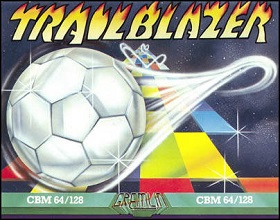
Trailblazer is a racing video game developed by Mr. Chip Software and published by Gremlin Graphics for the ZX Spectrum, Commodore 64, Atari 8-bit family, Amstrad CPC and Commodore 16/Plus/4 in 1986. It was ported to the Amiga and Atari ST.

Bug-Byte Software Ltd. was a video game company founded in 1980 in Liverpool, initially producing software for the Acorn Atom and ZX80. Bug-Byte's first hit was Don Priestley's Mazogs which was one of the most successful titles for the ZX81. In 1983, it published Manic Miner, considered to be one of the most influential platform games of all time. The company went into liquidation in 1985 but their name and logo were purchased by Argus Press PLC for use as a budget software label.
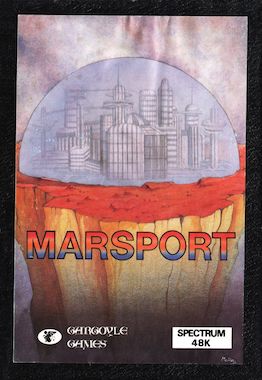
Marsport is a science fiction computer game that was released for the ZX Spectrum and Amstrad CPC home computers in 1985. It was published by Gargoyle Games in the United Kingdom and Dro Soft in Spain. Marsport was intended to be the first part of a trilogy called "The Siege of Earth" but parts two and three were not forthcoming. Because of this, it is often regarded as being part of an unofficial trilogy alongside Tir Na Nog and Dun Darach due to its having very similar gameplay to these titles. Marsport also has similarities to the later Gargoyle game Heavy on the Magick.

Cobra is a 1986 platform game based on the film of the same name. It was developed and published by Ocean Software, and was released in Europe for Amstrad CPC, Commodore 64 (C64), and ZX Spectrum. By 1990, it received a budget re-release.

Rambo is a 1985 video game based on the film Rambo: First Blood Part II (1985). The game was designed by David Collier and Tony Pomfret with the ZX Spectrum version converted by Platinum Productions.
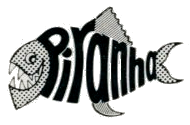
Piranha Software was a short-lived video game publishing label created by Macmillan Publishers in 1986 and closed eighteen months later. In that time it gained a reputation for its unusual output from well known developers such as Don Priestley, Design Design and Delta 4. The majority of their games featured licensed properties including the first video game based on the Discworld novels and two games based on the animated television series The Trap Door.
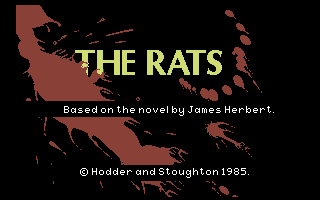
The Rats is a survival horror text adventure for the Commodore 64 and ZX Spectrum computers. It is based on the 1974 novel The Rats by James Herbert. The game was programmed by GXT, and published by Hodder & Stoughton, who were the publishers of James Herbert's book The Rats. An Amstrad CPC version was planned, but was never released.

Swords and Sorcery is a fantasy role playing video game developed and published by Personal Software Services. It was released exclusively in the United Kingdom for the ZX Spectrum in 1985 and the Amstrad CPC in 1986. The game contains elements of dungeon crawling and revolves around a customisable player-character navigating through catacombs in order to secure a large wealth of treasure, whilst simultaneously collecting seven pieces of sacred armour.
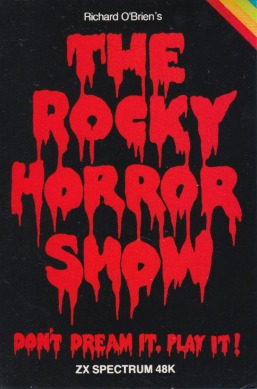
The Rocky Horror Show is a video game, based on the musical of the same name, it was developed and published by CRL Group. It was released for Apple II, Commodore 64, Commodore 128, ZX Spectrum, and Amstrad CPC created by the CRL Group PLC.
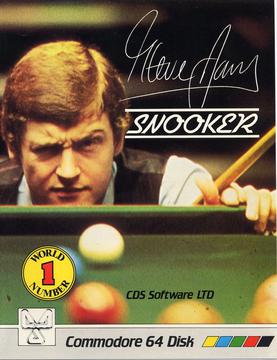
Steve Davis Snooker is a sports simulation video game developed and published by CDS Software in 1984. The budget release published by Blue Ribbon Software reached the top of the UK charts in May 1988. Steve Davis Snooker simulates the cue sport snooker. Released under licence from 6-time Snooker World Champion, Steve Davis.
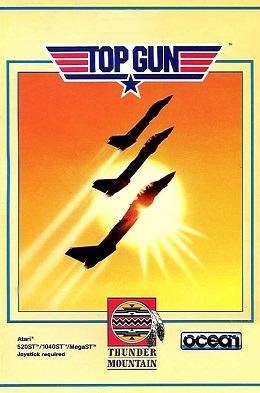
Top Gun is a 1986 combat flight simulation game based on the film of the same name. It was developed and published by British company Ocean Software, and was released for several computer platforms. In the United Kingdom, it was released for Amstrad CPC, Commodore 64, and ZX Spectrum in December 1986. The following year, it was released for Atari ST. In the United States, it was published by Thunder Mountain. In 1989, it was published by The Hit Squad as a budget re-release for ZX Spectrum and Commodore 64.

Seas of Blood is a video game published by Adventure Soft in 1985 for the Amstrad CPC, Commodore 64, and ZX Spectrum.
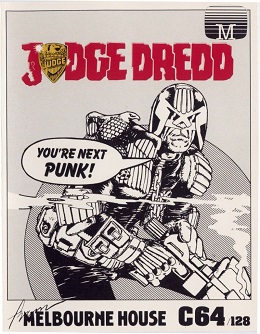
Judge Dredd is a platform shoot 'em up video game based on the character of the same name. It was developed by Beam Software and published by Melbourne House. It was released in Europe in 1986, for Commodore 64 and ZX Spectrum.

Yes, Prime Minister is a 1987 adventure game based on the television series of the same name. It was developed by Oxford Digital Enterprises and published by Mosaic Publishing. It was released in Europe for Amstrad CPC, BBC Micro, Commodore 64, DOS, and ZX Spectrum. Critics found it a faithful adaptation of the television series, but remarked on its high price, short length, and lack of long-term appeal.



















